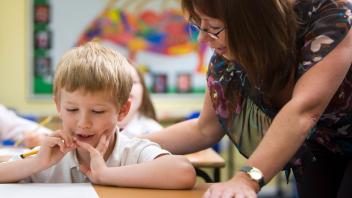Communication problems in school
Your child may have gotten help for speech or language problems before they started school. Or, you may notice problems when they start school. Your child may have trouble with:
- Speech sounds. They may have trouble saying sounds. They may not speak clearly and be hard to understand.
- Language and literacy. Your child may have trouble understanding what they hear. They may not follow directions or answer questions well. It may be hard for them to tell others about their thoughts. They may not say the correct words or say only short sentences. Language problems can also make reading and writing harder.
- Social communication. Your child may have trouble talking with other children. They may not make friends easily. They may not understand what others think or how they feel.
- Cognitive communication. These are the thinking skills your child needs to remember, solve problems, and use her imagination. Learning disabilities and brain damage can cause these types of problems.
- Feeding and swallowing. It may sound strange to think of eating as a school problem, but it can be. Feeding and swallowing problems can make it hard for your child to eat and drink enough during the day. This can make it hard to learn. It can also make social times, like lunch or snack, harder for your child.
- Stuttering. Your child may have trouble speaking smoothly. They may repeat sounds or words or have long pauses when they talk. Stuttering can make it hard to answer questions or give speeches in class. It can also make it hard to talk to friends.
- Voice. Your child may sound hoarse or lose their voice. They may sound like they talk through their nose, called nasality. Their voice may be too loud or too soft. Voice problems can make it hard to talk in class or with friends.
Effect of speech and language problems on learning
You need language skills to communicate. And you need to communicate to learn. Reading, writing, gesturing, listening, and speaking are all forms of language. The better your communication skills, the better you will do in school.
Does your child have speech or language problems? They may not be able to do grade-level work. They may have trouble reading, writing, and spelling. They may not understand social cues, like what a person means when they nod or look away as you speak. They may have trouble taking tests and may not want to go to school.
The school SLP should see your child. Each school has a process you need to follow to have your child seen. Your child may get referred to a child study team for testing. The SLP may be a part of this team, along with teachers, special education teachers, a psychologist, or others.
Role of the SLP
The SLP will test your child’s speech and language skills and decide if your child needs treatment. Each school has a process to get services started. The SLP or others in the school will help you follow this process.
Your child may get speech and language services alone or in a small group. The SLP may go into your child’s classroom and work with their teacher. The SLP will work with your child on what they are learning in class. The goal of speech and language services is to help your child do well in school. The SLP will work as part of a team that makes sure that your child gets the services they need.
Speech and language problems do not have to keep your child from doing well in school. SLPs can help.
Republished with permission of the American Speech-Language-Hearing Association
